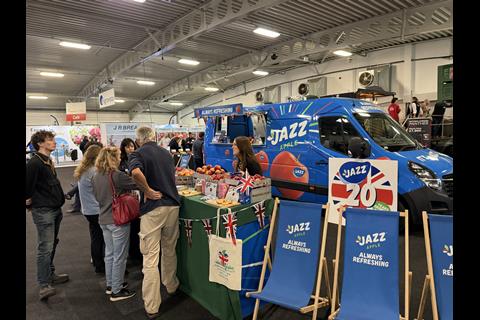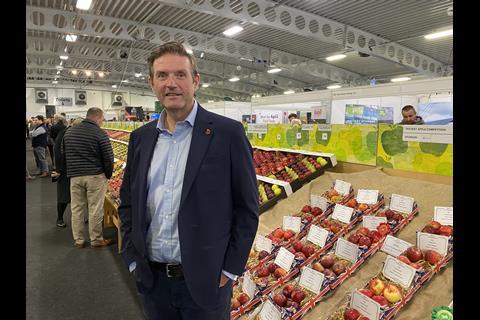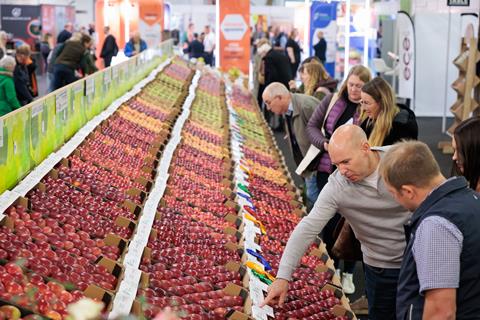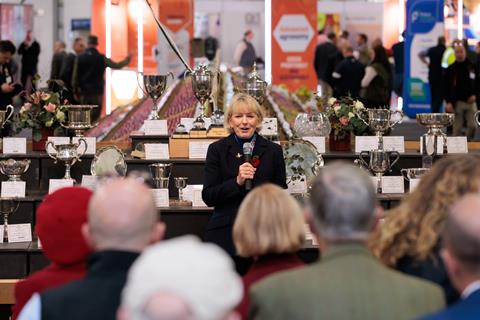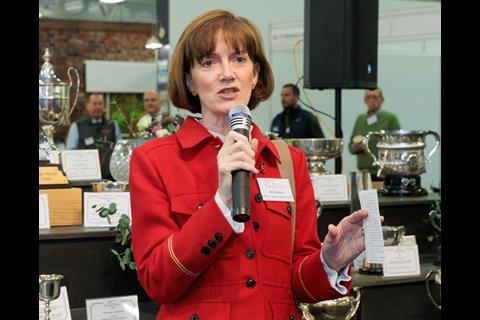Branded variety wins Tasteiest Apple for eighth time in 10 years, with supplier Worldwide Fruit reporting a high-quality apple harvest and trade body BAPL calling for government support on seasonal labour and energy costs
Jazz apples once again emerged victorious at the National Fruit Show in Kent, winning Tastiest Apple for the eighth year.
Jazz has now won the category in eight out of the last 10 years, making it the most successful branded variety in the award’s history.
Established in 1933, the National Fruit Show is the largest competitive display of commercially grown UK topfruit and soft fruit. This year’s winning entry for Tastiest Apple was submitted by Reuben Collingwood of Collingwood’s Fruit Farms in Cranbrook, Kent.
Tony Harding of Jazz supplier Worldwide Fruit said: “It’s great to see Jazz win the award again at the show. It’s such a consistent variety and delivers time and again for the customer.
“This year’s crop looks very good with great colour, high brix and fantastic flavour. We have strong plans to further develop our UK planting area over the coming three years to deliver the demand for the variety.”
Other winners at the show included JL Baxter & Son for best Gala, DJ & VL Knight & Partners for best Braeburn (65-70mm), and Gaskain Ltd for best Conference pears.
Claygate Farms won the NFU South East Prize for Best Fruit Exhibit in Show, while Nick Seymour of specialist tractor and machinery dealership NP Seymour won the Jon Jones Memorial Trophy.
The National Fruit Show, now in its 92nd year, reported an “excellent” number of exhibitors, visitors and competitors, with organisers saying the event has benefited from moving to a one-day format.
Ticket registrations were up 33 per cent on 2024, while entries for the topfruit prizes increased by 90 per cent.
Chair of competitions Annette Bardsley said: “The standard of fruit on display this year has been outstanding. It’s encouraging to see growers investing so much care and pride in their entries. The enthusiasm for both the traditional and new classes shows how important these competitions remain to the industry.”
High-quality British crop
Speaking to FPJ at the show, Worldwide Fruit boss Steve Maxwell was full of optimism about the 2025/26 British apple crop but emphasised the need for support from UK supermarkets.
“Volume sales of apples were down over the summer due to an increase in berry sales, so momentum was slow to get going at the start of the British apple season,” he said.
“We need to make sure the retailers get behind the British crop, especially since growers have so far picked a higher volume than expected, with tail-end varieties still to be harvested.
“The other good news is that I think the proportion of Class One fruit will be higher. It looks like a really clean crop. And there has been perfect weather for good colour and sugars.”
Labour and energy concerns
Topfruit growers have been boosted by the recent announcement that 41,000 seasonal worker visas will be granted to horticultural producers in 2026, 2,000 fewer than in 2025.
Executive chair of trade body British Apples and Pears, Ali Capper, told FPJ the reduction “wasn’t drastic” and has been received as “business as usual”, however she expressed concern about the “direction of travel”.
“From a grower’s point of view, reducing the number of seasonal worker visas creates a degree of uncertainty about what the government is going to do in the future.
“We are ambitious to grow UK apple production; we want to go from 40 per cent to 60 per cent [of the apples sold in UK supermarkets being British]; and there are no harvesting robots ready to be deployed commercially. So, if we want to become more self-sufficient in apples, we’re going to need more workers, not fewer.
“I don’t see other horticultural sectors declining, so it’s going to increase the pressure if we don’t maintain or increase the number of seasonal worker visas.”
The recently announced 94 per cent increase in electricity network charges is a more pressing concern for growers, particularly in the glasshouse sector, but also in apples and pears.
Capper said: “I don’t know yet to what extent that increase in cost will have to be passed on through the supply chain to retail. It will obviously be up to retailers if they pass it on to consumers, but supermarkets are being very clear with the government that all this additional tax is going to put food prices up.
“This is another tax, in effect. Increasing the standing charge for a sector that is producing one of the healthiest parts of our diet just does not seem logical, so we’re asking government to get the same dispensation as other manufacturing sectors to protect us having to increase food prices.
“We don’t want to do that, and let’s not forget that food inflation is driving overall inflation.”
